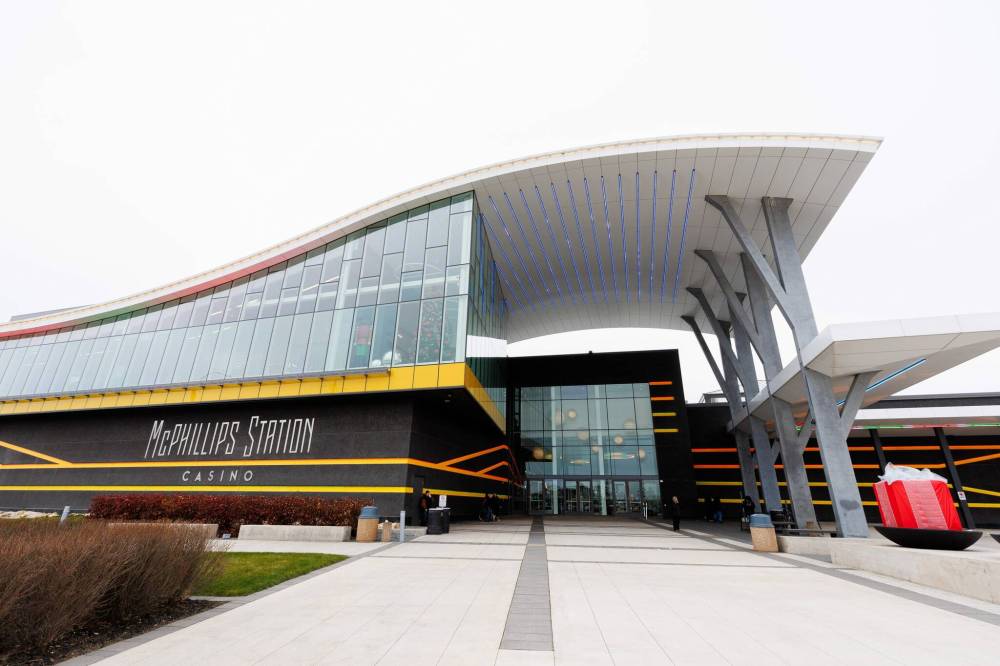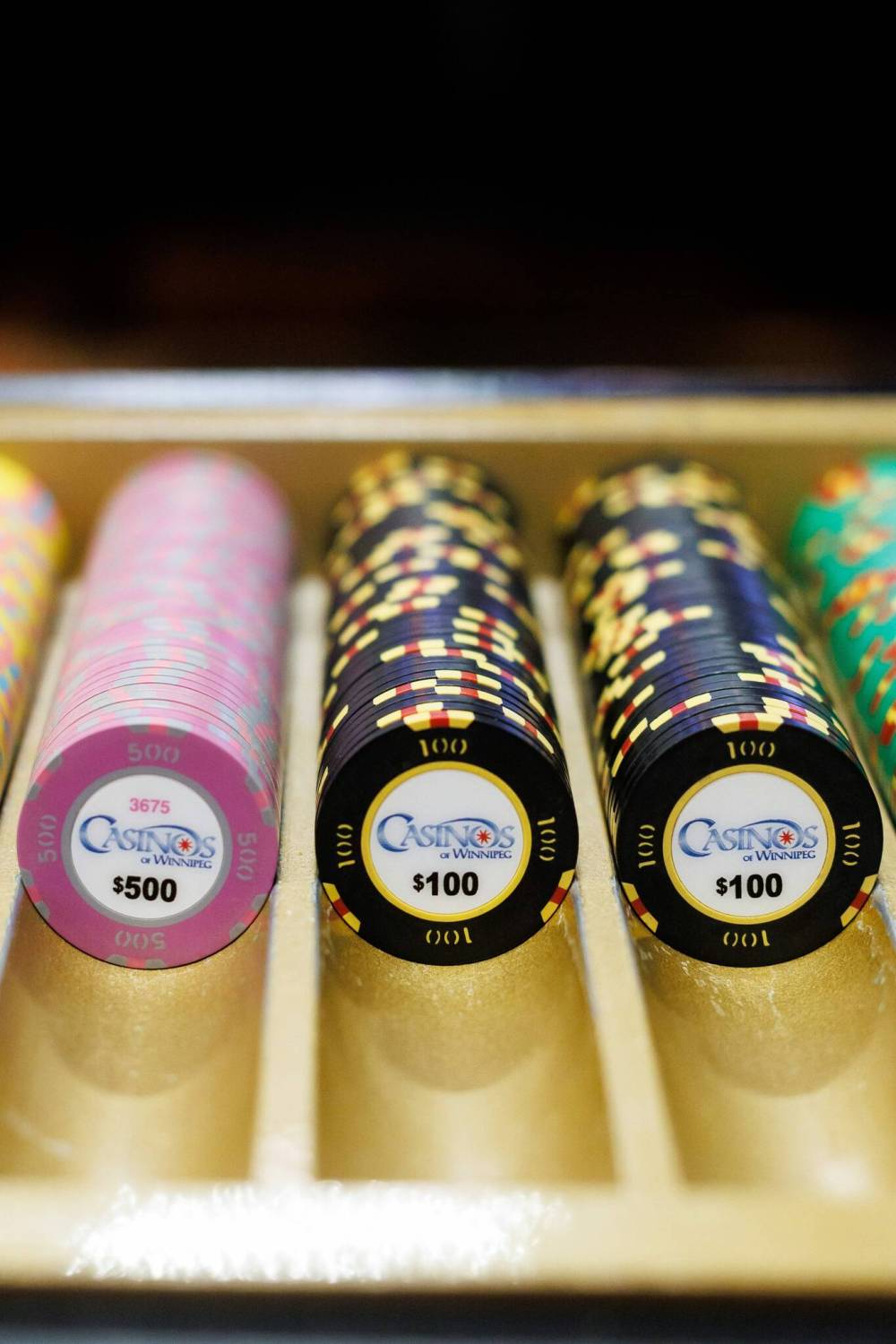Watching for washing at the casinos Manitoba Liquor and Lotteries on guard against criminals attempting to launder dirty money; high-profile cases involve millions of ill-gotten dollars
Read this article for free:
or
Already have an account? Log in here »
To continue reading, please subscribe:
Monthly Digital Subscription
$0 for the first 4 weeks*
- Enjoy unlimited reading on winnipegfreepress.com
- Read the E-Edition, our digital replica newspaper
- Access News Break, our award-winning app
- Play interactive puzzles
*No charge for 4 weeks then price increases to the regular rate of $19.95 plus GST every four weeks. Offer available to new and qualified returning subscribers only. Cancel any time.
Monthly Digital Subscription
$4.99/week*
- Enjoy unlimited reading on winnipegfreepress.com
- Read the E-Edition, our digital replica newspaper
- Access News Break, our award-winning app
- Play interactive puzzles
*Billed as $19.95 plus GST every four weeks. Cancel any time.
To continue reading, please subscribe:
Add Free Press access to your Brandon Sun subscription for only an additional
$1 for the first 4 weeks*
*Your next subscription payment will increase by $1.00 and you will be charged $16.99 plus GST for four weeks. After four weeks, your payment will increase to $23.99 plus GST every four weeks.
Read unlimited articles for free today:
or
Already have an account? Log in here »
Hey there, time traveller!
This article was published 22/11/2024 (411 days ago), so information in it may no longer be current.
Amid the slot machines’ flashing lights and the boastful murmurs around the poker table, surveillance cameras quietly captured a high roller and two of his associates strolling into Club Regent Casino one cold February day in 2022.
The man was dressed in a puffy white parka and had a medical mask covering his face. Slung over his shoulder was a bag containing a lot of cash — $300,000 in $100 bills.
He and one of his associates headed to the cashier wicket at the Transcona-area casino to convert the cash to chips.
It was not the first time the man, later identified as 32-year-old Mohammad Riyadul Hoque, had walked into one of Winnipeg’s provincial government-owned casinos with a bag full of cash.
Hoque had been known to generate internal incident reports during his casino visits, beginning in 2015. He told Manitoba Liquor and Lotteries investigators that he was born to wealthy parents and partially owned a Chicken Delight outlet, among other claims, on multiple occasions, in response to questions about the amount of cash he was carrying.
Investigators didn’t bite. Hoque was subsequently deemed a “high-risk” patron, his cash dubbed “suspicious” and all of his transactions flagged by the Crown gaming corporation for the Financial Transactions and Reports Analysis Centre of Canada — FINTRAC — a federal agency that assists in detecting and investigating money laundering, court documents say.
After all, even in the sensory-overloaded environment inside Winnipeg’s gambling facilities, Hoque was setting off alarm bells.
MIKE DEAL / FREE PRESS Mohammad Riyadul Hoque brought $300,000 cash to the Club Regent Casino in February 2022.
He is accused of laundering millions of dollars, mostly at Club Regent and McPhillips Station, and occasionally the downtown Shark Club, over three years beginning in 2021, money he allegedly made by trafficking cocaine and other illicit drugs in Winnipeg and northern First Nations. He is also accused of using the proceeds of his crimes to make real-estate purchases.
All told, it’s believed Hoque gambled $3.5 million and cashed out nearly $4 million in 2021, gambled $5.7 million and cashed out $6.2 million in 2022, and gambled $864,000 and cashed out about $439,000 in 2023. The numbers produced by MLL security investigators are documented in a Manitoba RCMP report to Crown prosecutors, filed in support of a civil forfeiture lawsuit by the province seeking to retain money and other property seized.
Hoque was charged with multiple money-laundering and drug-trafficking offences following an RCMP investigation prompted by MLL security. He is scheduled to appear in court in February.
The documents suggest the allegations represent the worst-ever case of money laundering — essentially “cleaning” money and other assets obtained by crime by siphoning through legitimate ventures — at Manitoba casinos.
However, his is not the only such case. It’s the second significant money-laundering operation that has surfaced in Manitoba criminal courts in the past year.
The Free Press sought to understand the extent of money laundering at Manitoba casinos — an environment experts say is rife for exploitation — and what the Crown corporation is doing to address it.
There is no mention of money laundering or efforts to combat it in any recent annual report from MLL, nor has it been raised at the legislative committee that oversees Crown corporations. MLL’s anti-money-laundering program merits a mention on the corporation’s website, but only with general information.
The corporation’s regulator — the Liquor, Cannabis and Gaming Authority of Manitoba — said laundering falls outside of its purview and declined to comment. FINTRAC said money-laundering legislation prevents the agency from making disclosures public.
The problem becomes public only via the court system or in police news releases detailing major busts.
The Free Press filed freedom-of-information requests seeking surveillance reports and written communications related to money laundering last February. It was the first step in what turned out to be a months-long and nearly fruitless pursuit, as the Crown corporation skirted Freedom of Information and Protection of Privacy Act legislation while also delaying subsequent attempts to seek answers.
After repeated requests, MLL chief executive officer Gerry Sul agreed to an interview this week.
MIKE DEAL / FREE PRESS Regan Mohr (left), general manager, Casino Operations, and Gerry Sul, president and CEO of Manitoba Liquor & Lotteries at the McPhillips Station Casino. 
Sul, who previously oversaw corporate security, surveillance and the corporation’s anti-money laundering program, stressed MLL takes it obligations to FINTRAC seriously, with a robust program and extensive training for staff, who are tested yearly in order to work on the gaming floor. The program undergoes internal audits every two years, as well as periodic audits by FINTRAC.
MLL’s anti-money-laundering compliance officer, who has a team of four staff members, has access to the executive and board to escalate concerns. The team works to identify suspicious patterns, such as individuals purchasing a large amount of chips, playing little and then cashing out.
Canadian casinos are required by law to report cash transactions exceeding $10,000 — filing separate reports for payouts and buy-ins — to FINTRAC, as well as any transaction they suspect could be related to money laundering or other illegal activity.
MLL handles all FINTRAC reporting for casinos, including on First Nations, and at VLT sites with more than 50 machines, in the province.
“Not following the compliance regime could come with all kinds of reputational risk — and also significant costs,” said Sul, noting FINTRAC can impose fines. “We know the importance of it and we take it seriously.”
He said the corporation files nearly 5,000 reports to FINTRAC annually, about 60 per cent of which he estimated are required for above-the-board transactions exceeding $10,000.
Of those 5,000 reports, about 400 are for suspicious transactions, and many of them may be related to the same individual, he said.
MLL’s responsibility is to detect and report suspected money laundering — then rely on FINTRAC and law enforcement to investigate further, he said.
“Organized crime is complex… in law enforcement, you’ve got to build a case, follow the money; you want to catch more people in the net, so (investigators) might step back and continue to watch,” he said during a conversation in a McPhillips Station bar and VLT room.
“We understand, it takes time…. It’s not in our control to take action. I wouldn’t call it frustrating, it’s the process.”
MIKE DEAL / FREE PRESS McPhillips Station Casino
A report commissioned by the B.C. government found billions of dollars were laundered at casinos in that province between 2008 and 2018. In the wake of the report, in which former B.C. Supreme Court Justice Austin Cullen criticized the province’s gaming corporation and minister responsible for not doing enough to stop the practice, a new gaming act was introduced.
Sul said Manitoba is a small player compared to other jurisdictions, such as B.C.
“We know our players — when somebody comes into our tables and buys in for $200,000, it’s an anomaly… so I think we have a better ability in a local casino to spot anomalies, to spot players that are not normally running through our casinos,” he said, adding provincial regulations and MLL policies make laundering more difficult here.
“Individuals like Mohammad Hoque, that stood out like a sore thumb.”
However, given the enormous sums of money that move through casinos — approximately $8 billion in wagers over a given year at MLL — he acknowledged that it’s still an environment rife for attempted exploitation.
“As small as we are, as easier as it is to detect, we never let our guard down,” Sul said.
Sandra Guiboche has been described as the “matriarch” of Winnipeg’s pink crack cocaine trade. As “president and CEO,” she used an iron fist to operate a sophisticated drug-trafficking organization in Point Douglas, and she turned to Manitoba’s casinos to launder her money.
Guiboche, 60, was sentenced to 10 years in prison earlier this year for a slew of drug-trafficking related offences. Security footage captured, on multiple occasions, Guiboche feeding money into casino machines and then cashing out without gambling, her June sentencing hearing was told. She also laundered money through real-estate purchases.
A civil forfeiture lawsuit filed after her 2021 arrest also flagged her behaviour, with Liquor and Lotteries security designating Guiboche as a “high-risk player due to the high amount of suspicious cash transactions and apparent high amount of money lost.” No dollar figures were included in the court documents.
MIKE DEAL / FREE PRESS Casino betting chips at a table at the McPhillips Station Casino. 
The Free Press also uncovered a third case — an attempt at laundering that was quickly caught by gaming officials. Morgan Stuart Knott, later convicted of gun and drug offences, refused to provide ID to pick up $60,000 in casino winnings in the 2017 incident.
In a document filed in support of the subsequent civil forfeiture suit involving Knott, the manager for anti-money-laundering compliance at Liquor and Lotteries detailed some of the activities that raise red flags.
The affidavit singled out as suspicious behaviour the use of money obtained by crime to buy chips and then using them for gaming; using money obtained by crime for VLTs; converting money to chips, taking them from the casino and cashing them out at a later date; and converting large amounts of cash, especially smaller denominations into larger-denomination bank notes.
Matthew McGuire is an expert in money laundering, having previously worked for FINTRAC and private forensic accountants, who now advises corporations and governments on how to detect and prevent the crime.
He was taken aback by how much money Hoque is accused of gambling and how much he managed to cash out, but was not surprised Manitoba’s casinos are a target, given the extent of the money-laundering problem across Canada in casinos and other institutions.
“There is a huge money-laundering problem in Canada, and it finds its way to the casinos,” said McGuire.
“There is a huge money-laundering problem in Canada, and it finds its way to the casinos.”–Matthew McGuire
Casinos should exclude players they deem suspicious as a means of addressing the problem, he said.
University of Manitoba law professor Michelle Gallant, also an expert in tainted money, agreed excluding players would be an easy step. She also suggested banning all cash from casinos.
Sul said MLL has discussed the possibility of excluding players, but there are concerns people who have done nothing wrong could be wrongfully banned.
McGuire said it appears Manitoba Liquor and Lotteries security took the right steps in Hoque’s case by identifying suspicious behaviour, seeking information on the money’s origins and, ultimately, getting the RCMP involved.
It shines a light on the extent of the problem in Canada, which he said has little in the way of resources for investigations and prosecutions.
“It’s a fire hose going into a garden hose, and nobody takes these things up,” he said.
McGuire said if Hoque was allegedly able to launder millions of dollars over several years, he suspects others have also tried to target Manitoba casinos.
As an example of the transient nature of the illegal trade, McGuire noted criminals simply moved on to casinos in other jurisdictions, such as Ontario, after B.C. began to crack down.
“When I see a weak link, the word gets out very quickly,” he said. “If he was doing this, he wasn’t the only one.”
“If he was doing this, he wasn’t the only one.”–Matthew McGuire
McGuire said Canada’s expensive anti-money-laundering regime is ineffective. Federal and provincial governments must “plow resources” into investigations and prosecutions if there is any hope of putting a dent in the problem.
The Financial Action Task Force on Money Laundering, an international body that sets government standards, is currently reviewing Canada’s anti-laundering practices.
“Last time we didn’t fare well, and rumour has it that we’re going to be grey-listed,” McGuire said. “Already, the U.S. calls us a jurisdiction of primary money-laundering concern.”
Gallant said the problem in Canada, particularly in large markets such as B.C., is significant, but difficult to gauge, as is the effectiveness of the anti-money-laundering regime.
However, she said it’s reasonable to extrapolate from the extent of the drug trade and organized crime — in Manitoba and elsewhere — the scope of the money-laundering problem.
“All drug money is dirty money and it all needs to be laundered, so there must be significant money laundering happening,” she said.
erik.pindera@freepress.mb.ca

Erik Pindera is a reporter for the Free Press, mostly focusing on crime and justice. The born-and-bred Winnipegger attended Red River College Polytechnic, wrote for the community newspaper in Kenora, Ont. and reported on television and radio in Winnipeg before joining the Free Press in 2020. Read more about Erik.
Every piece of reporting Erik produces is reviewed by an editing team before it is posted online or published in print — part of the Free Press‘s tradition, since 1872, of producing reliable independent journalism. Read more about Free Press’s history and mandate, and learn how our newsroom operates.
Our newsroom depends on a growing audience of readers to power our journalism. If you are not a paid reader, please consider becoming a subscriber.
Our newsroom depends on its audience of readers to power our journalism. Thank you for your support.






